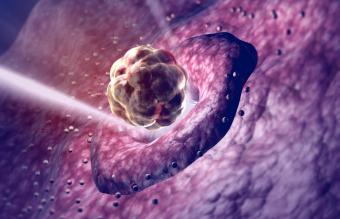
Unfortunately, heartburn during pregnancy is fairly common. Experts estimate that heartburn affects approximately 50 percent of all pregnant women, with the condition being more common in the second and third trimesters. It doesn't indicate any problem with the health of your baby, but it can make you rather uncomfortable.
What Is Heartburn?
Heartburn, sometimes called acid indigestion or acid reflux, refers to the painful burning sensation in the esophagus caused by the regurgitation of gastric acid. Heartburn has nothing to do with the condition of your heart; the name comes from the proximity of the burning sensation to your heart muscle.
Part of the reason that women experience heartburn during pregnancy is that weight gain of any sort increases the amount of pressure in the abdomen, which can push stomach contents back into the esophagus. Another reason it's more common to have heartburn when you're pregnant is that changing hormone levels can affect how your body tolerates different foods.
If you didn't have frequent heartburn before your pregnancy, it's likely your symptoms will disappear shortly after childbirth.
Treating Heartburn during Pregnancy
There are a number of different strategies you can try to get relief from pregnancy-related heartburn.
Dietary Changes
During pregnancy, the easiest way to deal with heartburn is to make dietary changes to try to reduce or eliminate the problem. Because the safety of any medication during pregnancy is always a concern, it's best to try a natural solution whenever possible.
Heartburn affects everyone differently. Some people find that only one or two foods will cause heartburn consistently, while others find their list of triggers is much larger.
Foods that tend to make heartburn worse include:
- Oranges, grapefruits, and other tangy citrus fruits
- Tomatoes and tomato-based products such as marinara sauce
- Foods seasoned with garlic and onion
- Chili peppers
- Cheese
- Nuts
- Avocados
- High fat red meat
- Peppermint
- Chocolate
- Caffeine
- Carbonated beverages
One common home remedy for heartburn symptoms is to drink a glass of milk with a bit of honey mixed into it. Eating bananas also provides heartburn relief for some people.
In addition to changing what you eat, you may also want to think about changing how you eat. Eating slowly and consuming several smaller meals instead of three larger ones can provide some relief from heartburn symptoms. Some people also find that drinking fewer liquids with your meals can help to reduce heartburn symptoms. Another trick to try is chewing a stick of gum after each meal; this may help to neutralize excess stomach acid.
Clothing
Did you know that an uncomfortable wardrobe can make heartburn worse? Make sure you're not wearing clothing that is excessively tight around your abdomen. Pants that are too small for your growing belly can place unnecessary pressure on your stomach, which will make your heartburn worse. Stretchy yoga pants are stylish and comfortable to wear when you're running errands or lounging around the house.
Sleeping Patterns
Many women who suffer from heartburn during pregnancy find that the problem tends to be worse at night. Consuming a large meal right before you lie down can cause heartburn, even if the meal doesn't include any of the common heartburn triggers. If possible, you want to wait at least two hours after eating to go to bed for the night or take a nap.
Elevating your head a few inches when you sleep may also help to reduce heartburn. You can use blocks to physically raise the head of your bed or try placing pillows under your shoulders to keep stomach acid from rising back into your chest.
Over-the-Counter Medications
Generally, most doctors believe it's safe to take TUMS or Pepcid for heartburn when you're pregnant. TUMS can provide relief on the spot, but Pepcid works better for chronic heartburn. If TUMS or Pepcid don't provide the relief you need, Maalox may be an option to consider as well.







